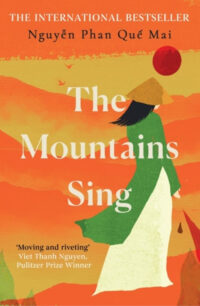Book review: The Mountains Sing by Nguyén Phan Qué Mai
 Sometimes a book breaks your heart but you love it anyway. For me, The Mountains Sing by Nguyén Phan Qué Mai hit that spot. It’s a novel about Vietnam through most of the twentieth century, told through one family.
Sometimes a book breaks your heart but you love it anyway. For me, The Mountains Sing by Nguyén Phan Qué Mai hit that spot. It’s a novel about Vietnam through most of the twentieth century, told through one family.
After a very brief prelude, it opens in Hanoi in 1972. Twelve-year-old Hương and her grandmother Diệu Lan are running to a bomb shelter as the air raid sirens sound yet again. Hương’s parents and uncles have disappeared down the Ho Chi Minh Trail to fight in the war. Years later, Hương can only hope no news is good news.
Hương and her grandmother decide they must walk up into the mountains with only the food and clothing they can carry, in search of safety from the American bombs. They return months later to a devastated Hanoi and must piece a life back together, including literally rebuilding their home.
This tale is interspersed with the story of Diệu Lan’s childhood further south, in central Vietnam. Like Hương has experienced in her short life, Diệu Lan had a happy, comfortable home until a series of invaders culminating with the Japanese unsettled everything, and then came the blow of the North Vietnamese Communists, who took an extreme, violent approach to redistribution of wealth.
“Oh Guava, I used to think that we were the ones in charge of our destinies, but I learned then that, in time of war, normal citizens were nothing but leaves that would fall in the thousands or millions in the surge of a single storm.”
Importantly, the Trần family saga doesn’t end with the peace treaty of 1975. It takes months for the missing to start coming home, or even news of them. And when some of them do arrive, the new political reality causes rifts in the family and brings to the surface old tensions. To understand her family, now-teenage Hương must learn the rest of her grandmother’s tale.
Terrible things happen in almost every chapter of this book, with the “bad guys” rarely being the same twice. Nguyén depicts the awful results from foreign invasions, American bombings and divisive internal politics alike. People turn on their friends, neighbours and even family in the face of horrific situations.
“In your schoolbooks, you won’t find anything about the Land Reform nor about the internal fighting of the Việt Minh. A part of our country’s history has been erased, together with the lives of countless people. We’re forbidden to talk about events that relate to past mistakes or the wrongdoing of those in power, for they give themselves the right to rewrite history. But you’re old enough to know that history will write itself in people’s memories, and as long as those memories live on, we can have faith that we can do better.”
But somehow this isn’t misery porn. It’s a beautifully told coming-of-age story set in a time of conflict. The conflict isn’t mere background, but it isn’t the only thing happening in Hương’s life either. She’s a human being with likes and dislikes, good days and bad days, hopes and fears.
Diệu Lan, the grandmother, is an awesome character. She has made crazy tough decisions and clawed her way back to a comfortable life multiple times. We could all benefit from a Diệu Lan in our life.
This is Nguyén’s first novel and first book written in English. I am very curious to read some of her non-fiction in translation, and her forthcoming novel Dust Child. I imagine it will appeal to fans of other novels about East Asian countries dealing with war and its aftermath such as How We Disappeared by Jing-Jing Lee or The Garden of Evening Mists by Tan Twan Eng, both of which I also loved.
Published 2020 by Oneworld.
One Comments
Comments are closed.